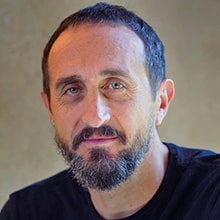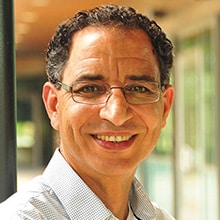Scientists with Texas Biomed’s Southwest National Primate Center Receive San Antonio Area Foundation Grants
Grants support studies in potential treatments for Diabetes and Leukemia
San Antonio, Texas (May 4, 2017) – Dr. Tiziano Barberi and Dr. Marcel Daadi, Associate Scientists at the Southwest National Primate Research Center at Texas Biomedical Research Institute, received individual grants from the John L. Santikos Charitable Foundation, a fund of the San Antonio Area Foundation, to support pilot projects in diabetes and lymphoblastic leukemia research.
Pilot projects are small, early stage research studies aimed at determining the feasibility of a project in an effort to scale up the study if the project concept shows promise. At Texas Biomed, pilot studies are generally first steps to proving a concept so that scientists can apply for greater funding from national grant institutions, like the National Institutes of Health.
Tackling T-Cell Acute Lymphoblastic Leukemia

Dr. Barberi received a $20,000 grant for his pilot project titled, Exploring A Possible Novel Approach For The Treatment Of T-Cell Acute Lymphoblastic Leukemia (ALL).
“ALL is the most common form of childhood cancer, and although a lot of progress has been achieved towards a cure for this group of conditions, too many children are still dying of this disease,” Dr. Barberi said. “Of all forms of ALL, 15-25 percent are classified as T-cell ALL (T-ALL), because the cells that are malignant are T-lymphocytes.”
In previous studies, Dr. Barberi determined that a specific signaling pathway directly affects the expression of a gene called SCL/TAL-1. This gene is essential for blood cell development but when it is abnormally expressed, SCL/TAL-1 is responsible for the malignant transformation of T lymphocytes, leading to the development of T-ALL. By activating this signaling pathway with a specific molecule, Dr. Barberi found that SCL/TAL-1 expression was dramatically reduced. He has since started to treat an SCL/TAL1 positive T-ALL leukemia cell line with this molecule, and initial results are encouraging.
“Further study will allow us to confirm whether treatment with this molecule is responsible for the death of T-ALL cells,” Dr. Barberi said. “While we are years away from any type of clinical application and there is still much to understand, this study could provide the basis for an innovative treatment based on the direct inhibition of the cause of malignant cell growth.”
Searching for New Diabetes Treatment

Dr. Daadi received a $35,000 grant for his project titled, Developing Stem Cell Therapy for Treating Diabetes. The project aims to develop a unique approach to treating diabetes.
Dr. Daadi and his team are engineering stem cells derived from the skin or blood cells of patients and coaxing them into insulin producing cells, which will be then microencapsulated and grafted under the skin of a patient.
“We can take skin or blood cells and reverse their physiological clock to make them pluripotent stem cells able to generate billions of any kind of cells on the body,” Dr. Daadi explained. “These are called induced-pluripotent stem cell (iPSCs). During this past year we have been able to turn these pluripotent stem cells into islet-like β-cells producing insulin in a dish.”
The plan for this study is to now microencapsulate these cells and test them in a baboon model of diabetes.
“This pilot study will lay the groundwork for a larger long-term trial on the effectiveness and safety of implanting iPSC-derived microencapsulated β-cells in baboons,” Dr. Daadi said. “If we are successful, these studies could accelerate the development of a viable long-term stem cell therapy for diabetes patients.”
“Mr. John L. Santikos entrusted the San Antonio Area Foundation with the privilege of continuing his support to the community,” said Dennis Noll, CEO, San Antonio Area Foundation. “We are pleased to carry out his wishes by funding these valuable projects in his focus field of health and wellness, especially in the area of diabetes research. Diabetes is prevalent in our community, and Mr. Santikos saw a need in finding solutions to help decrease its impact.”
###
About Texas Biomedical Research Institute
Texas Biomed is one of the world’s leading independent biomedical research institutions dedicated to advancing health worldwide through innovative biomedical research. Texas Biomed partners with hundreds of researchers and institutions around the world to develop vaccines and therapeutics against viral pathogens causing AIDS, hepatitis, hemorrhagic fevers and parasitic diseases responsible for malaria and schistosomiasis. The Institute also has programs in the genetics of cardiovascular disease, diabetes, obesity, psychiatric disorders and other diseases. The Institute is home to the Southwest National Primate Research Center (SNPRC), which provides broad services in primate research and hosts research programs in regenerative medicine and aging, lifestyle disorders and infectious diseases. SNPRC contributes to a national network of National Primate Research Centers (NPRCs) with specialized technologies, capabilities and primate resources. For more information on Texas Biomed, go to www.TxBiomed.org.
About San Antonio Area Foundation
For more than 50 years, the San Antonio Area Foundation has served as the community foundation for the San Antonio area. The Area Foundation helps donors achieve their charitable goals and serves as a collaborative leader, investing in the future of our community by bringing people together to address key community issues. The Area Foundation manages more than 500 charitable funds and $905 million in assets. Since 1964, $358 million for scholarships and grants have been awarded to nonprofits that educate youth, preserve the environment, protect animals, fund research and provide a variety of services that enhance the quality of life in our region. Learn more about your community foundation at saafdn.org.